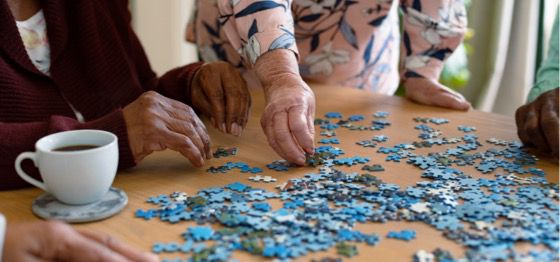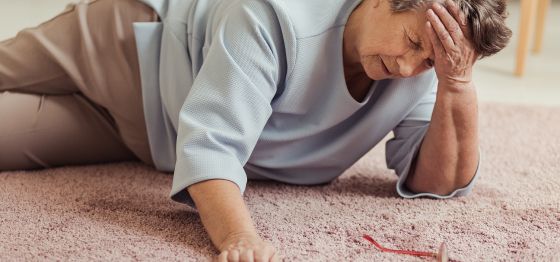Pneumonia, caused by bacteria, viruses or fungi, is an infection that fills the air sacs in the lungs with fluid, making the absorption of oxygen into the bloodstream more difficult.1 Pneumonia is a leading cause of hospitalization for more than a million older adults every year.2 It can be deadly, as tens of thousands of people in the United States die from pneumonia each year, the majority being adults over the age of 65.3
What are the heightened risks of pneumonia in older adults?
Pneumonia may affect anyone at any age, but older adults aged 65 and over are especially vulnerable.4 This is due to seniors’ immune systems naturally growing weaker and the likelihood of having chronic health conditions like asthma, chronic obstructive pulmonary disease (COPD), congestive heart failure, cystic fibrosis and diabetes.5 Being elderly also means the risk of having pneumonia grow more dangerous, with terminal pneumonia becoming a strong possibility. Some of these heightened risks include:6
Bacteria in the blood. The pneumonia bacteria in the lungs can spread to the blood and then onward to different parts of the older adult’s body.
Breathing issues. If a senior has severe pneumonia in combination with chronic lung issues, breathing may be greatly affected, and a breathing machine may be needed during the healing process.
Fluid buildup. Pneumonia may cause fluid to build up in the chest cavity and the fluid may become infected. If this happens, the fluid must be drained or removed via surgery.
Lung abscesses. When pus grows in the lung cavity, an abscess occurs. A lung abscess can usually be treated with antibiotics, but drainage with a long needle or surgical removal may be necessary.
What are symptoms of pneumonia in older adults?
The pneumonia symptoms experienced by older adults can be very different than those affecting other age groups and may include:7
- Feelings of weakness or unsteadiness, which may increase the risk of falls
- No fever or a lower-than-normal body temperature
- Confusion or delirium
- Decreased ability to perform daily activities
- Urinary incontinence
- Lack of appetite
- A worsening of existing health conditions
Since these symptoms in older adults can be so different than the typical ones experienced by other age groups—coughing that brings up phlegm, fever, chills, chest pain, shortness of breath—it can be difficult to recognize and may result in a delay in diagnosis and treatment.8
What are the primary causes of pneumonia in seniors?
Older adults usually get pneumonia from people close to them. That’s what makes pneumonia in nursing homes and assisted living facilities so dangerous. Not only do they live close together, but these seniors are more likely to be physically inactive and have underlying conditions that can make pneumonia worse.9 Older adults may also contract pneumonia during a stay in the hospital, an environment that’s full of germs and pneumonia strains that may be resistant to antibiotics.10 Another primary cause of pneumonia in seniors is aspiration, the inhalation of foreign materials like food, saliva or vomit into the lungs. Older adults with swallowing disorders are often at higher risk of getting this type of pneumonia.11
What signs of pneumonia in older adults should trigger a visit to the doctor?
Since pneumonia can rapidly become serious in the senior population, early detection is extremely important. Older adults should see a doctor whenever they notice these signs:12
- Trouble breathing
- Fingernails, face, or lips that exhibit a bluish color
- Chest pain
- Either a high fever or a temperature lower than normal
- Delirium, new confusion or changes in the ability to function
What are treatments for pneumonia in older adults?
Sometimes pneumonia in older adults can be treated at home, but depending on the severity of their symptoms and their overall health, a hospital stay may be in order. When the pneumonia is caused by bacteria, seniors may receive antibiotic treatment orally or intravenously (IV).13 Since antibiotics aren’t effective against the viruses that cause pneumonia, treatment is usually focused on supportive care, hydration, pain relief and monitoring of vital signs.14 If an older adult has advanced pneumonia that requires a stay in the hospital, other treatments may include oxygen therapy, IV fluids or time on a ventilator.15
What are ways to prevent pneumonia in older adults?
Older adults can help prevent pneumonia by taking these important steps:16
- Get the pneumococcal vaccine to help prevent pneumonia caused by S. pneumoniae. There are 2 pneumococcal vaccines for adults ages 65 years and older. Seniors should check with their doctors about which 1 is recommended for them.
- Get the influenza vaccine each year, because pneumonia is a potential complication of the flu. There’s a high-dose flu vaccine that’s specially formulated for adults ages 65 years and older.
- Practice good hand hygiene; washing hands regularly may help prevent many types of infections including pneumonia.
- Avoid smoking, which damages the lungs, making it harder to fight off respiratory infections.
- Make healthy lifestyle choices. Eating a balanced diet, exercising regularly and getting enough sleep are good for overall health and may also keep the immune system strong.
Following these tips and checking for early warning signs may help seniors to avoid illness or minimize the dangers of pneumonia.
Go365 by Humana® makes wellness fun and easy. We help Humana Medicare members with Go365® on their plan reach health goals, as well as take care of their physical and emotional health—allowing members to thrive at any age.
Humana Medicare members with Go365 on their plan can enroll in Go365 at
Go365 is a well-being and rewards program for many Humana Medicare Advantage members. Rewards have no cash value and can only be redeemed in the Go365 Mall. Rewards must be earned and redeemed within the same plan year. Any rewards not redeemed by December 31st will be forfeited.
If you need to enroll in Medicare Advantage or change your plan outside of the usual Medicare Annual Election Period, a Special Election Period (SEP) could be the answer. For information on eligibility, visit Humana’s
To learn more about Humana Medicare Advantage, call to speak with a licensed Humana sales agent at 1-844-321-5843 (TTY:711), Monday – Friday, 8 a.m. – 8 p.m. local time or visit
Sources:
1“Does Medicare Cover the Pneumonia Vaccine?”, National Council on Aging, last accessed April 6, 2023,
2Forest W. Arnold, DO, et. al. “Older Adults Hospitalized for Pneumonia”, Journal of the American Geriatrics Society, last accessed April 6, 2023,
3“Learn About Pneumonia”, American Lung Association, last accessed April 6, 2023,
4“Does Medicare Cover the Pneumonia Vaccine?”
5“Does Medicare Cover the Pneumonia Vaccine?”
6“What to Know About Pneumonia in Older People”, WebMD, last accessed April 6, 2023,
7“What to Know About Pneumonia in Older Adults”, healthline.com, last accessed April 6, 2023,
8“What to Know About Pneumonia in Older Adults.”
9“What to Know About Pneumonia in Older Adults.”
10“What to Know About Pneumonia in Older Adults.”
11“What to Know About Pneumonia in Older Adults.”
12“What to Know About Pneumonia in Older Adults.”
13“What to Know About Pneumonia in Older Adults.”
14“What to Know About Pneumonia in Older Adults.”
15“What to Know About Pneumonia in Older Adults.”
16“What to Know About Pneumonia in Older Adults.”
This information is provided for educational purposes only. It is not to be used for medical advice, diagnosis or treatment. Consult your healthcare provider if you have questions or concerns.
Humana is a Medicare Advantage HMO, PPO and PFFS organization with a Medicare contract. Humana is also a Coordinated Care plan with a Medicare contract and a contract with the state Medicaid program. Enrollment in any Humana plan depends on contract renewal.






